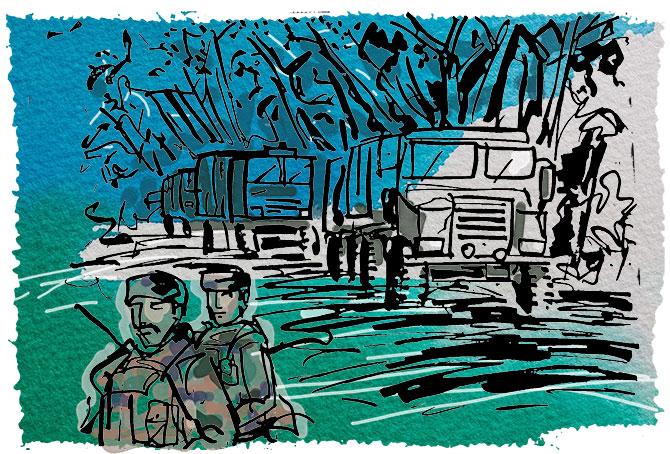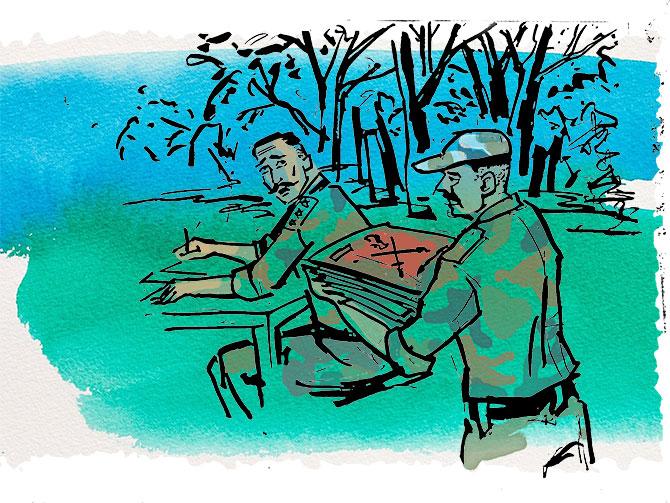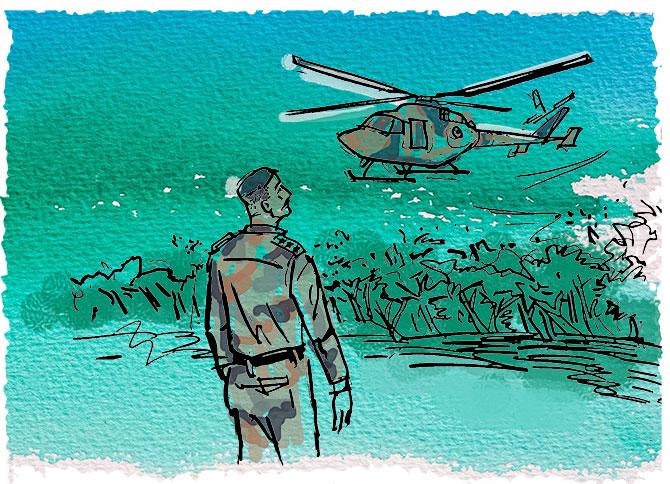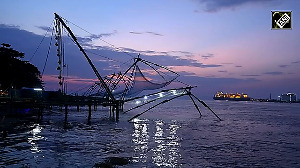'On Teacher's Day, I never fail to remember those spirited men of the 390 Field Company who moulded me into an army officer worthy of being their commander,' says Colonel K Thammayya Udupa (retd).
Illustrations: Dominic Xavier/Rediff.com

Our pre-commission training at the academy prepares us to be infantry platoon commanders.
After we were commissioned as lieutenants, those of us who joined the Corps of Engineers proceeded to attend the Young Officers course, only after completion of which were we to experience regimental life.
When I joined the regiment, though my commanding officer ordered my posting to a field company, due to a strange set of events, I never got to see it for almost seven months. I was not even in the regiment for most of the period.
The normal practice of newly commissioned officers spending a month or two, in the barracks with the jawans and performing all duties like a jawan, did not happen in my case.
I finally returned to the regiment late one evening at the end of those seven months. On the very next morning, a Sunday, my commanding officer promoted me to captain and in the evening moved me to my field company.
The company was deployed in a heavily insurgency infested area, almost 250 km away from the regimental headquarters.
For security reasons, all military vehicles moved in heavily armed convoys and it took at least two days to travel those 250 km.
The company had been moved few months back to an absolutely uninhabited area in a mountainous region, into a thick jungle. The nearest human habitation was about 10 km away.
The narrow and winding hill roads ensured that it took almost two hours to reach the nearest army unit, located 40 km away.
We had been tasked to suitably transform the thickly wooded jungle to enable a brigade headquarters to be relocated there.
I had been moved there overnight as my company commander -- the only officer deployed with the company -- was to be away for a long time.
In effect, without having served even for a day as a platoon commander, an almost newly commissioned Thammayya Udupa became the officiating company commander of a field company deployed in a majestic isolation.

Under normal circumstances a young platoon commander learns most of his on-ground soldiering under the tutelage of the company commander and the company second-in-command.
But I was in anything but normal circumstances. So, did my on-ground learning suffer? Not in the least, as I now realise.
I was to learn much later that my commanding officer had personally spoken to the senior-most junior commissioned officer (Senior JCO) of the company and had told him to ensure that 'the grooming of the young officer' did not suffer due to the absence of the company commander.
"Just think that it is my own son that I am sending to your company. I would like him to be so groomed that he is fit to occupy my chair when his time comes."
Apparently, the senior JCO had responded, "Sir, I will train the new captain sahab as I would like my own son to be trained to be made worthy of your chair."
The commanding officer set the boundaries, "Do it in a very inconspicuous manner. It should never come in the way of his being your company commander."
Meanwhile, oblivious to this grand design, I was euphoric. Finally I was to be in a field company, that too as its 'boss', the lone officer, with no army units for miles around.
Communication with the regiment was restricted to the radio relay, twice a day, often erratic. Thus, with all the exuberance of youth I felt that I was accountable to nobody. My head was already in the clouds and my feet nowhere on the ground.
But the schemers had other ideas.
On the very first day, the company clerk brought in a huge bundle of files. Very apologetically, he told me that the regiment had called for a 'files summary,' but the company commander had been too busy to do it and now it was overdue.
The typewriter had broken down. And yes, he had a recurring wrist pain, so he helpfully suggested that I prepare the 'files summary' in my own hand, in duplicate.
If it could be finished by midnight, he assured me that with some help from the Military Police, he would dispatch it the next morning and it would reach the regiment in a couple of days.
Before I could react, some emergency was created by the other protagonists and he had to rush away. The clerk was untraceable thereafter.
The handful of others who were nearby feigned complete ignorance about the 'files summary'. I spent the entire day and a good part of the night going over all the files and preparing the so-called 'files summary'.
The net result was that by the time this arduous exercise came to an end, I had on my fingertips an up to date status of the company activities. I also learnt how official correspondence was to be dealt with.
I was imbued with a new confidence that I would be able to handle it easily, even without the company clerk.
It was only much later that I learnt that the painstakingly prepared 'files summary' was a non-existent requirement and my hard work had been carefully stashed away never to see the light of the day.
Soon after, a similar situation was created by the storekeeper, then by the quartermaster and then someone else. Without making it obvious, I was being subjected to a crash course in all company related matters.
My euphoria balloon was punctured. In an unobtrusive manner I was being repeatedly shown that there was much more to being an army officer than just strutting around in the olive green uniform.
The gravity of the situation, that I was responsible for the well-being and welfare of more than 150 men, their tactical and technical deployment in the sensitive area and the optimum utilisation of stores and equipment worth crores of rupees started sinking in.
Most importantly, I realised that my flippancy could seriously hurt the the izzat of my company and my regiment.

One day we suddenly received a message that a very senior officer would be landing at our helipad. He was to spend a few minutes there till his helicopter was refuelled. No other instructions were conveyed.
I took the message at face value and was feeling happy that there was nothing for me to do. But those who had appointed themselves my mentors? Well, they had other intentions.
In quick time a sketch of our worksites was prepared, the latest data on the work done by us was tabulated, snacks and tea were readied and I was covertly bullied to brief the visitor.
I was even made to do a few rehearsals of the briefing. Needless to mention, the stopover was a thundering success with the amused visitor actually patting me on the back and saying, "Son, you don't have your company commander here but you seem to be none the worse for it."
On another occasion I was at one of the worksites when a JCO, having witnessed something seriously wrong from afar, rushed in and took the site incharge Havildar to task.
When I mentioned that he was not to blame but was acting on my instructions, he would have none of it, and berated him, "You are an experienced Havildar, is this how you work?" A few more such incidents later I was to realise that pulling up the poor jawans acting on some of my insufficiently thought through instructions was their way of teaching me that I needed to be more careful in planning the tasks.
I had no option but to plan more diligently. I did not wish to carry the guilt of anyone being in the line of fire due to my sloppiness.
An important life lesson was imparted to me by the senior JCO in my very first week there when our only dozer had a major breakdown. My first reaction was to inform the commanding officer straightaway about the problem.
The experienced JCO whispered to me, "Sir, problem is what a helpless man conveys to a superior. But when a person in the company commander's shoes discusses with CO sahab, it should be a 'paristhiti' (situation), not a problem."
He carefully nudged me into contacting the superintending engineer of a construction project nearby. With their support we were able to put the dozer on road, albeit temporarily.
Later, in the next possible radio transmission when I narrated the 'paristhiti' to the commanding officer that our dozer work had suffered but just for a few hours, and was able to precisely quantify the support required of him, I could easily discern the relief in his voice.
The well-orchestrated but extremely subtle on-ground training continued for almost seven months. I continued to remain unaware of the behind-the-scenes efforts put in by the key conspirators of the scheme.
It was only when the company commander returned and let the cat out of the bag that I learnt of the monumental efforts that had gone into grooming me to be a worthy member of the family.
Many years later, on the day I became the commanding officer of the same regiment, I felt that the secret deal between my first commanding officer and the reliable and trustworthy senior JCO of my field company had borne fruit.
I paid a silent tribute to my commanding officer for his out-of- the-box plan and to the senior JCO for its meticulous execution.
Every year on September 5, Teacher's Day, I always bow my head as I remember all the teachers who had taught me in school, college, military academy, army courses and so on.
Also, on Teachers Day, I never fail to remember those spirited men of 390 Field Company (The Three Ninety) who opened their arms to me with tremendous respect, love and affection but yet were very exacting while moulding me into an officer worthy of being their commander. They will always be up there in that special place I have for all my teachers.
On this Teacher's Day, once again, I bow to you, The Three Ninety.











 © 2025
© 2025